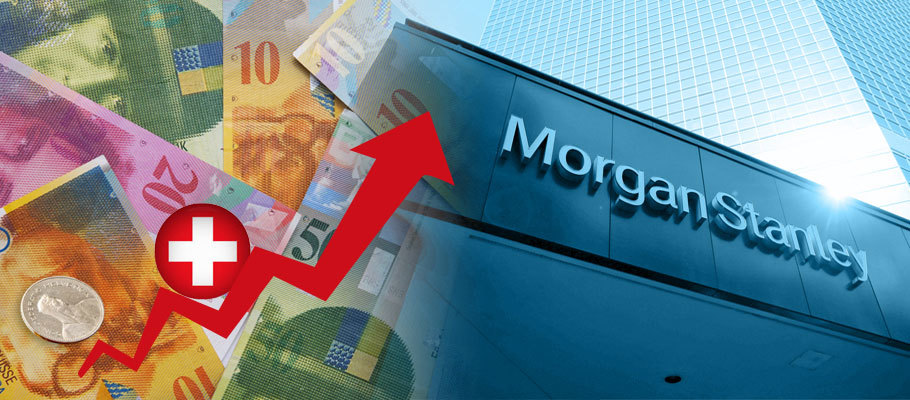
Published: November 17th, 2021
The Swiss franc (CHF) has reached a new 18-month high against EUR and is up against GBP this week, but global investment bank Morgan Stanley believes the franc will soon run out of steam against other G10 majors.
The Swiss fiat’s gains have come amid conditions that would typically see it on the back foot. Global investor sentiment is upbeat, which usually sees the safe-haven franc decline. Switzerland’s central bank has also shown little interest in raising interest rates anytime soon.
Central bank interest rate divergence and buoyant markets are key historical drivers, yet they haven’t delivered weakness as expected.
Morgan Stanley’s currency analysis unit said in an investor note this week that CHF has demonstrated strength in recent weeks despite an improving macro backdrop and higher global yields. That’s left a lot of forex traders wondering what the currency’s current drivers are.
Morgan Stanley’s analysis shows a reduction in speculative short positions on the franc, combined with a broad euro weakness and widening Eurozone peripheral spreads. The result has been an unexpected boost for the franc.
‘Short positioning in franc bets has dropped significantly, especially off the back of recent CHF strength,’ Morgan says. Morgans also believes that a drop in the euro to franc exchange rate, which has dipped to 18-month lows of 1.0534 this week, point to increasing speculation that there will be a response by the Swiss National Bank (SNB) in the coming days.
Meanwhile, the pound to franc exchange rate stands at 1.2349 at time of writing. That extends a lowering trend that began in mid-October.
An unexpectedly strong franc reduces the cost of Swiss imports but raises the price of Swiss exports. In the past, the SNB has said these are deflationary forces that could bring economic headwinds to the alpine nation.
As central banks go, Switzerland’s is one of the most active when it comes to pushing back the strength of its currency. More interventions could be on the way if the franc demonstrates further appreciation.
Morgan Stanley says one key driver of the currency’s recent gains is the trend relating to Eurozone sovereign bonds, especially a ‘sharp widening’ of periphery spreads.
The bank’s forex analysts also noted a divergence in the yields paid on German and Italian government bonds as a key indicator of how investors are evolving their approach to different conditions in different Eurozone countries.
When bond yields diverge in this way, it suggests investors are looking for a more significant premium on holding Italian bonds, one of the so-called ‘peripheral’ Eurozone countries.
This effect was visible in the extreme when the Eurozone debt crisis happened in 2009. The yields paid on Greek, Italian, and Spanish bonds took off as investors looked to offload potentially damaging debt positions.
A combination of external assistance, debt reform, and generous European Central Bank policy ultimately bought the crisis under control, as the ECB purchased peripheral bonds to keep their yields down.
In a market comment this week, Barclays said the franc’s recent strengthening is partly driven by divergence between Italian bonds (BTPs) and those of Germany's Bunds. Given what’s happened in the past, that divergence means the Swiss central bank will need to stay on its toes.
Barclays also says bond yield divergence in 2021 indicates an expectation by forex markets that the ECB will accelerate the pace of tapering its quantitative easing programmes while re-evaluating the need for an interest rate hike to calm rising inflation.
Traders are worried that could expose some of the Eurozone's weaker economies to hardship.
Those conditions have made for a weaker Euro against the safe-haven franc, but Morgan Stanley’s analysis predicts the franc’s strong run will soon peter out.
‘Any further or sudden widening in eurozone peripheral spreads probably won’t happen, as the ECB is surely ready to act if any disproportionate tightening of financing conditions arises.’
The bank’s analysts also believe the ECB will double the pace of its APP bond buy-back programme to EUR 40 billion per month once the PEPP bond purchase programme ends in March 2022.
Furthermore, they say, the investor support offered by portfolio repositioning will probably fade soon. Numbers from the options market suggest investors have already scaled back most of their short CHF positions due to the recent rally.
In terms of action by the SNB, Morgan Stanley believes a more aggressive response is coming to balance some of the franc’s ongoing strength.
‘After months of relative docility, the SNB’s forex interventions show that Zurich has returned to currency markets during the past three weeks.
Morgan believes the central bank will step up those interventions if the EUR/CHF rate falls below the bank’s threshold for action of 1.05.
Barclay’s also believes markets should expect a more vigilant SNB, given the recent move lower in EUR/CHF.
Morgan Stanley is telling clients to go 'long' USD/CHF in expectation of future franc weakness, but they say betting on a euro recovery is premature.
‘Though we expect limited further downside in EUR/CHF from here, we do not believe the time is right for a shift to long EUR/CHF positions’.
Heading into the end of the year, EUR/USD will likely keep moving lower. Weakness in ten-year German Bund yields will also be expected to offset some of the upside pressure on EUR/CHF brought by higher US yields.
On the other hand, Barclays sees an opportunity for tactical positions to benefit from further franc gains since Switzerland's historically low inflation tends to contain domestic real yield erosion.
‘Worries about rising inflation and lower growth after last week's US CPI and consumer sentiment should also keep the franc in bid that's to its safe-haven status,’ Barclay’s says.